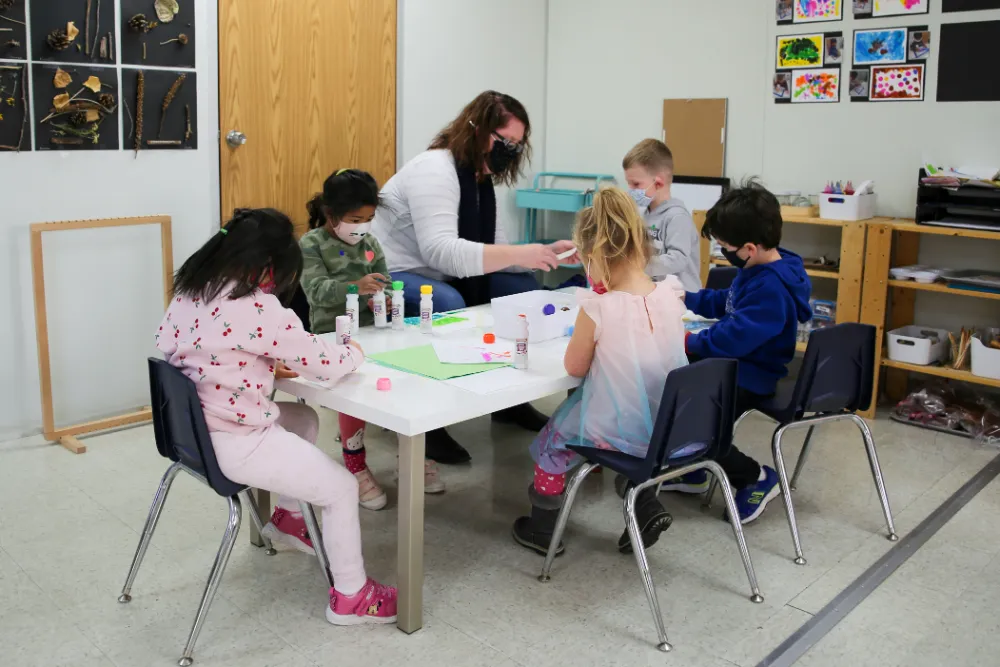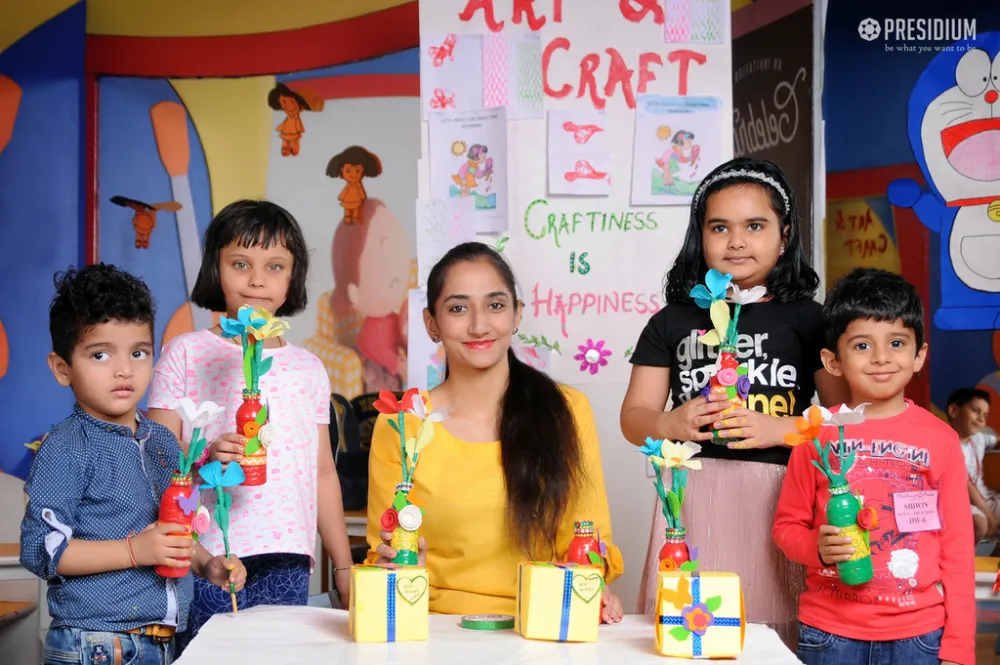NTTC Courses

Source: saymedia-content
NTTC Courses
As you delve into the world of NTTC Courses you’ll encounter a blend of modern teaching methods and profound child psychology insights. Those applicants who desire to build a career in preprimary teaching can easily enroll for NTTC courses and qualify for the same.
NTT Diploma requires academic education till HSC i.e., the 10+2 level of education, and PG Diploma demands for Graduation.
This enlightening program strives to equip aspiring nursery teachers with the skills they need to shape young minds, guiding their path toward a bright future.
Vidhyanidhi Education Society (VES) a government-registered teaching beacon of excellence in teacher training and education, offers pivotal courses to invigorate your career in teaching. Our mission has always been to foster a new generation of world-class educators, who possess the knowledge, skills, and attitudes required for shaping the future of education.
VES has consistently achieved this through our highly regarded NTTC Courses. An in-depth program designed specifically for those who aspire to contribute to early childhood education, our NTT Course is an effective blend of theoretical understanding, practical skills, and innovative pedagogical strategies
Table of Content

Source: riverstoneschool
What Is NTT Course?
The NTT Course or Nursery Teacher Training Course is a specialized educational program designed to teach educators how to handle the developmental needs of young children aged 3 to 6 years.
Upon completion, this course paves the way for numerous career paths in the educational industry. NTT Course qualified trainees often find positions as teachers in preschools, nurseries, kindergartens, or playgroup environments.
NPTT Career Scope
With the successful completion of the NTT course from VES, future educators will be fully equipped to discover the world of teaching. Jobs await in private preschools, kindergartens, Montessori schools as well as aided and non-aided government schools.
You’re also primed to work in daycare centers, crèches, NGO schools, early childhood centers, and preparatory schools. Beyond traditional employment, you can also start your preschool, activity club, or educational resource center.
NPTT Career Scope are varied, including roles such as:
- Teacher or Assistant Teacher
- Head of School Center
- Supervisor
- Principal
- Director of a Preschool Center
- Running an NGO for Preschool Education
- School Administrator
- Home Tutor
- Shadow Teacher
- Educational Entrepreneurship: Own and Operate a Playschool, Nursery, Kindergarten, Crèche, Daycare Center, and more.
Source: thechildrenshouse
Nursery Course Online
Vidhyanidhi Education Society brings in the most convenient and highly in-demand learning mode for NTTC Courses i.e., “THE ONLINE MODE”.
The advantages of opting for the online NTT course from VES are plenty:
- Globally recognized Nursery Teacher Training certificate
- Opportunity to enroll at any season of the year
- Freedom to take the course from any geographical location
- Requirement of only a robust internet connection
- Each module accompanied by pre-recorded material
- Expert course coordinator to steer you through the course
- Certificate devoid of any ‘online course’ mention
- Hassle-free home delivery of all essentials, including study material, assignments, and certificates.
To enroll for Nursery Course Online click here
Requirement NTT Teacher
To enroll for NTTC Courses, desired applicants need to have successfully passed the 12th standard. Meanwhile, if you are considering enrolling for a Postgraduate Diploma in Nursery Teachers Training Course, graduation from any field of study is a must.
NTT Course Time Duration
The VES Diploma and PG Diploma NTTC Courses take one and two years to complete. But at Vidhyanidhi Education, the FAST TRACK mode provides you with an opportunity to conclude the course in the span of one year.

Source: thepresidiumschool
Vidhyanidhi Education Society stands to facilitate top-notch training and instill the confidence necessary to secure your dream job.
The flexible NTTC Courses at Vidhyanidhi facilitate trainees with all the skills and teaching methodology required for an effective teaching environment, VES offers regular, online, and correspondence options. If in-person lectures aren’t feasible, the online or correspondence modes will serve you well.
Our Regular Mode NTT Course boasts the following features:
- Cozy, conducive classrooms
- Personalized student attention
- Comprehensive workshops covering a range of topics
- Affordability
- Internship certification
- Strong practical training orientation
- Workshops dedicated to Art Craft and Teaching aids
Online NTT Course Fees
Fostering top-tier educators and augmenting the quality of education is the primary goal of Vidhyanidhi Education Society’s (VES) NTT course. With its job-centric orientation, the course has successfully guided numerous trainees toward their professional goals.
A distinguishing feature of the NTTC Courses at VES is its reasonable and flexible fee structure. The Online and Offline Nursery Teacher Training Course comes with the provision of paying fees in installments. Moreover, VES extends multiple online payment modes, like Cash, Cheque, GPay, Paytm, etc., for better convenience.
Reach out to us at 9869546913 or 9869866277 for any inquiries about the Fees for NTTC Courses at VES.
How Much Does a Nursery Teacher Earn a Month?
There’s a broad salary range for nursery teachers, which can change depending on the school they work in, the school board it follows, their experience within early childhood education, academic qualifications, seniority level, and specific school regulations.
Being a proprietor of a preschool can be a financially advantageous decision after graduating from VES with an NTTC qualification. In major urban areas, a nursery teacher can generally command a monthly salary between Rs. 15,000 and 28,000. In the rural sector, the range is slightly less, from Rs. 12,000 to 18,000.

Source: thenortherncentre
Nursery Teacher Training Distance Education
With a busy schedule, other commitments or restrictions of location often lead to choosing the “Distance” option to acquire certain qualifications.
Distance learning is no less than regular mode, it provides equal aspects of knowledge and skills at convenience. Vidhyanidhi Education Society is driven to provide superior training that dovetails with the individual needs of its trainees. As such, it provides a correspondence learning pathway, effectively serving students residing at distant locations.
Vidhyanidhi Education Society provides myriad benefits of Nursery Teacher Training Distance Education:
- VES certificates that have earned global acceptance
- Respectable pay packages owing to the high global repute of VES
- Pre-recorded lectures for every topic
- personalized guidance from a dedicated course coordinator, facilitating smooth completion of the correspondence course
- Year-round enrolment opportunities
- Evaluation of trainees’ performance via assignment-based assessments
- Practical training experiences, including a letter of internship
- Substantial time and cost savings by choosing the correspondence course
- Reasonable tuition fees with a wide variety of payment options available
NPTT Syllabus
At Vidhyanidhi Education Society, our Nursery Teacher Training Course is a comprehensive program designed to develop confident, skilled, and passionate educators. If you’re interested in shaping young minds and hearts, we welcome you to join us on this rewarding journey.
Here is just the overview of the NPTT Syllabus:
Understanding Child Development
It focuses on understanding child development, trainees learn about the physical, social, and psychological growth of children from birth to age six. It provides insights into various developmental milestones and how they influence a child’s learning capacity. We also explore theories of child development from renowned thinkers like Piaget, Erikson, and Vygotsky.
Pedagogical Techniques and Methods
VES course introduces trainees to various teaching methodologies and strategies suitable for young learners. It covers a wide range of approaches including Montessori, Reggio Emilia, Waldorf, and the Traditional method. We believe in the importance of exposing trainees to a variety of teaching methods to allow them to develop their unique teaching styles.
Lesson Planning and Classroom Management
A crucial component of the NTT Course is preparing the trainees to handle real classroom situations effectively. This section imparts valuable skills such as creating engaging lesson plans, managing a diverse classroom, handling conflicts, and fostering a positive learning environment. Our hands-on approach encourages trainees to apply these skills in real-world settings through case studies and role-plays.
Child Health and Nutrition
Child health and nutrition is another vital part of the curriculum. Trainees are educated about basic child healthcare, nutrition, and the role of a healthy diet in a child’s physical and cognitive development. The aim here is to equip educators with the knowledge to guide children and parents about balanced nutrition and its significance in early learning.
Creativity and Learning
VES emphasizes the importance of creativity in early childhood education. From integrating arts into the curriculum to creating innovative learning resources, we provide our trainees with the tools and strategies they need to spark creativity and imagination in their learners.
Technology in Education
In the technologically advanced era, educators must be well-versed in educational technology. It introduces trainees to various ed-tech tools and how they can be used to facilitate effective learning and engagement in a nursery setting.

Source: ves
Which Is Better NTT or B Ed?
NTT (Nursery Teacher Training): NTT programs are designed to train individuals specifically for teaching young children in nursery schools or preschools. These programs focus on early childhood education and cover subjects such as child development, classroom management, curriculum planning, and teaching methodologies for young learners.
NTT programs typically have a shorter duration compared to a full-fledged bachelor’s degree. With NTTC qualification educators can apply for teaching positions in preprimary schools or preschools and can teach at the preprimary level.
B.Ed (Bachelor of Education): B.Ed is an undergraduate degree program that prepares individuals to become professional teachers in schools. It is a comprehensive program that covers various aspects of education, including pedagogy, educational psychology, subject-specific teaching methods, curriculum development, assessment techniques, and classroom management.
B.Ed programs generally have a longer duration, usually spanning a period of three to four years. With B.Ed qualifications, educators can apply for positions at the primary and secondary levels in schools.
To determine which is better for you, consider the following factors:
Career Goals:
If you aim to specifically work with young children in nursery schools or preschools, NTT would be more appropriate as it provides specialized training in early childhood education. However, if you aspire to teach in primary schools, secondary schools, or higher education institutions, a B.Ed degree would be more suitable.
Duration:
NTT programs are generally shorter in duration compared to B.Ed programs. If you prefer a shorter course of study and want to enter the workforce sooner, NTT may be a better choice.
Scope and Flexibility:
B.Ed programs offer a broader scope of study and can provide more opportunities for career advancement in the education sector. They may also offer specialization options, allowing you to focus on a specific subject or educational level. B.Ed degrees are generally considered more comprehensive and recognized in the teaching profession.

Source: drskids
How to Teach Class Nursery?
Teaching nursery or preschool-age children requires a specific approach that takes into account their young age, short attention spans, and their need for active, engaging learning experiences.
Here are some tips to help you teach a nursery class effectively:
Establish a positive and welcoming classroom environment:
Create a warm and inviting space that is safe, colorful, and filled with age-appropriate learning materials. Use visual cues like posters or labels to help children navigate the classroom and understand the different areas.
Plan structured routines and activities:
Young children thrive on routines, as they provide a sense of stability and predictability. Plan a daily schedule that includes a balance of activities such as circle time, storytime, arts and crafts, playtime, snack time, and outdoor play. Keep transitions between activities smooth and well-managed.
Encourage active learning:
Nursery children learn best through hands-on experiences and active participation. Incorporate interactive activities that allow them to explore, manipulate objects, and engage their senses. Use games, songs, rhymes, and movement activities to make learning fun and engaging.
Use visual aids and props:
Visual aids, such as flashcards, charts, and pictures, help reinforce learning and make concepts more tangible for young children. Use props and real-life objects to illustrate abstract ideas and promote understanding.
Nursery-age children are developing their social and emotional skills. Encourage positive social interactions by providing collaboration, turn-taking, and sharing opportunities. Help children express their emotions and develop empathy through discussions, stories, and role-playing activities.
Introduce basic concepts through play:
Use play-based activities to introduce and reinforce basic concepts like colors, shapes, numbers, and letters. Incorporate educational toys, puzzles, and building blocks that promote problem-solving and fine motor skills.
Communicate effectively:
Use simple and clear language when interacting with nursery children. Get down to their eye level and maintain eye contact to establish a connection. Use gestures, facial expressions, and body language to enhance communication.
Encourage independence:
Nurture a sense of independence by allowing children to perform simple tasks on their own, such as cleaning up toys or pouring their drinks during snack time. Provide opportunities for self-help skills and encourage problem-solving.
Assess progress informally:
Traditional formal assessments may not be suitable for nursery children. Instead, use informal methods like observation, anecdotal notes, and portfolios to track their progress. Focus on their individual growth, strengths, and areas for improvement.
Remember that each child is unique, and adapting your teaching style to meet their needs and abilities is important. Building positive relationships with both the children and their parents will contribute to a successful nursery teaching experience.
“Enrich. Inspire. Educate. Begin with VES today!”
Call or Whatsapp at +919869546913 / +9198698 66277 for more details.
For Downloading the brochure click here





